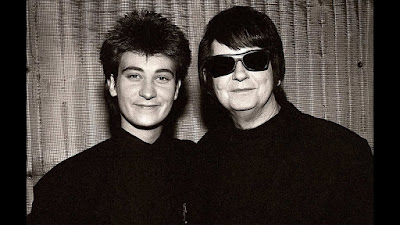Happy Once and Then Twice
Original Facebook post here.
Today's formative-album replay: Everything But The Girl, Idlewild. A fair amount of the records that made it into my collection a quarter century ago came via my college newspaper hookup; a much smaller number of those made it into frequent rotation, let alone my personal pantheon. This slick, circumspect album by a band I didn't follow much, either before or since, somehow wedged in there and stuck. A big bar to entry, now as then, is the deadly-tasteful late-'80s MOR production sound—the shallow snare, the noodling acoustic leads, the salad-bar sax, keyboard patches that were already clichés at the time. But either the songs are strong enough, or that framing is unobtrusive enough, that the '80s soft-pop sound has always gone down with me more as a balm than an irritant.
On this revisit, two elements jumped out at me and imprinted the album on me anew. The first is Tracey Thorn's yearning smudge of a voice, which shrinks to a disarmingly naked flutter at key emotional moments—a flaw most singers would probably fix or unlearn but which she turns into a bracing, soulful effect. The second is the unmistakable lyrical preoccupation of so many of the songs with children, family, home, aging, and midlife resignation, which must have sounded incredibly wise and grown-up to me at the tender age I first heard it, and which if anything makes these songs that much more devastating now that I'm past the age of these singers' earnest worries and equivocations. Songs like "Apron Strings" and the above (the only tune forefronting Ben Watt's voice) are openly should-we-or-shouldn't-we-have-kids songs, but it's easy to hear the entire album through the prism of that not-quite-young-anymore crossroads.
I don't think I'd noticed, for instance, the painfully wishful thinking of a song like "These Early Days," in which the singer admonishes a two-year-old to remember these good times because they won't last. This is either blissful naïveté or intentional irony, but either way I find the premise unaccountably moving—especially given the lightly joshing but achingly vulnerable way Tracey sings it.
When we say songs "age well," we usually think we're referring to some kind of timeless quality or universality in their essence. I'm prepared to admit, after this subtly stirring replay, that we cherish songs over the years because, like old friends, they knew us when, and, no matter how old we get, they still have our number—even after our number's changed.
Comments:
Today's formative-album replay: Everything But The Girl, Idlewild. A fair amount of the records that made it into my collection a quarter century ago came via my college newspaper hookup; a much smaller number of those made it into frequent rotation, let alone my personal pantheon. This slick, circumspect album by a band I didn't follow much, either before or since, somehow wedged in there and stuck. A big bar to entry, now as then, is the deadly-tasteful late-'80s MOR production sound—the shallow snare, the noodling acoustic leads, the salad-bar sax, keyboard patches that were already clichés at the time. But either the songs are strong enough, or that framing is unobtrusive enough, that the '80s soft-pop sound has always gone down with me more as a balm than an irritant.
On this revisit, two elements jumped out at me and imprinted the album on me anew. The first is Tracey Thorn's yearning smudge of a voice, which shrinks to a disarmingly naked flutter at key emotional moments—a flaw most singers would probably fix or unlearn but which she turns into a bracing, soulful effect. The second is the unmistakable lyrical preoccupation of so many of the songs with children, family, home, aging, and midlife resignation, which must have sounded incredibly wise and grown-up to me at the tender age I first heard it, and which if anything makes these songs that much more devastating now that I'm past the age of these singers' earnest worries and equivocations. Songs like "Apron Strings" and the above (the only tune forefronting Ben Watt's voice) are openly should-we-or-shouldn't-we-have-kids songs, but it's easy to hear the entire album through the prism of that not-quite-young-anymore crossroads.
I don't think I'd noticed, for instance, the painfully wishful thinking of a song like "These Early Days," in which the singer admonishes a two-year-old to remember these good times because they won't last. This is either blissful naïveté or intentional irony, but either way I find the premise unaccountably moving—especially given the lightly joshing but achingly vulnerable way Tracey sings it.
When we say songs "age well," we usually think we're referring to some kind of timeless quality or universality in their essence. I'm prepared to admit, after this subtly stirring replay, that we cherish songs over the years because, like old friends, they knew us when, and, no matter how old we get, they still have our number—even after our number's changed.
Comments:
Justin Warner I don't know this album but "Amplified Heart" is a standard in my collection...





Comments
Post a Comment